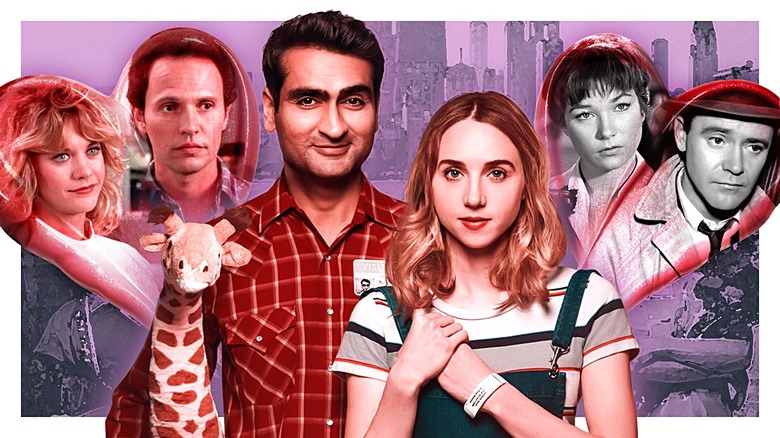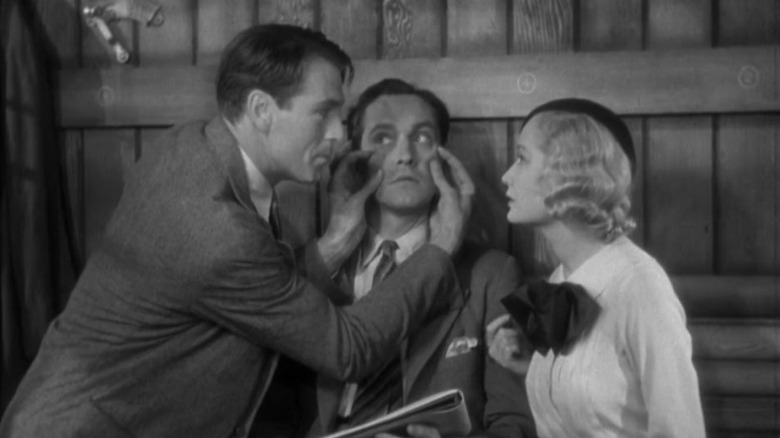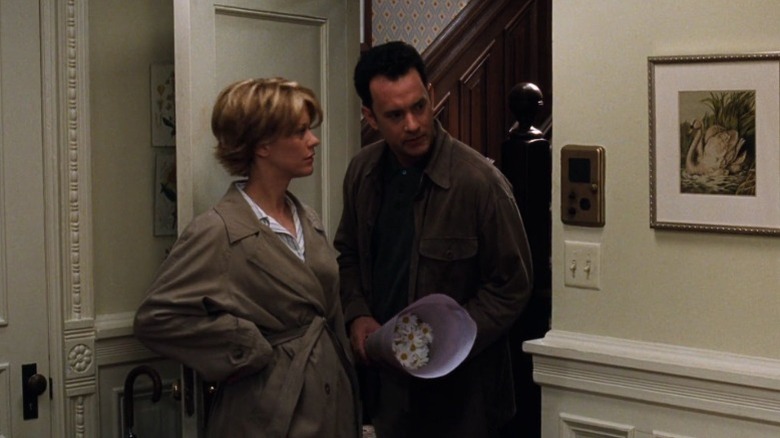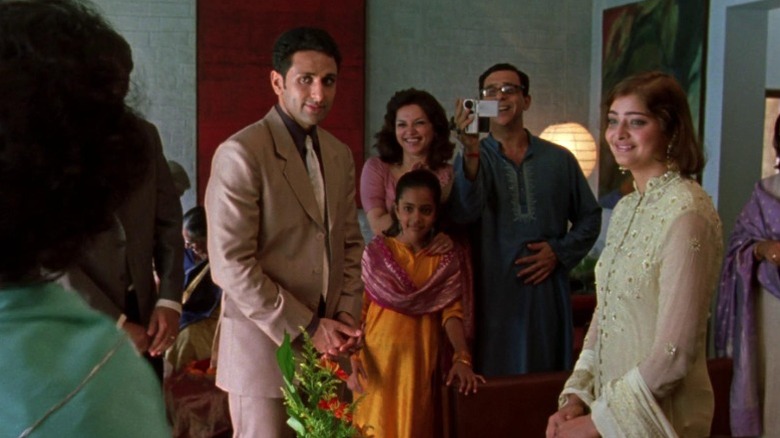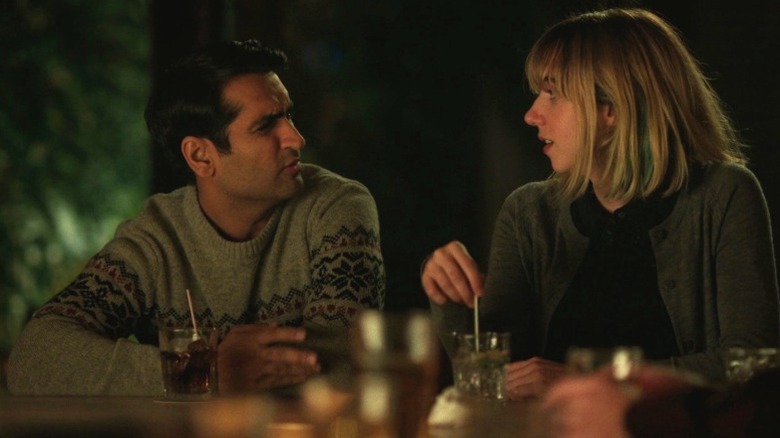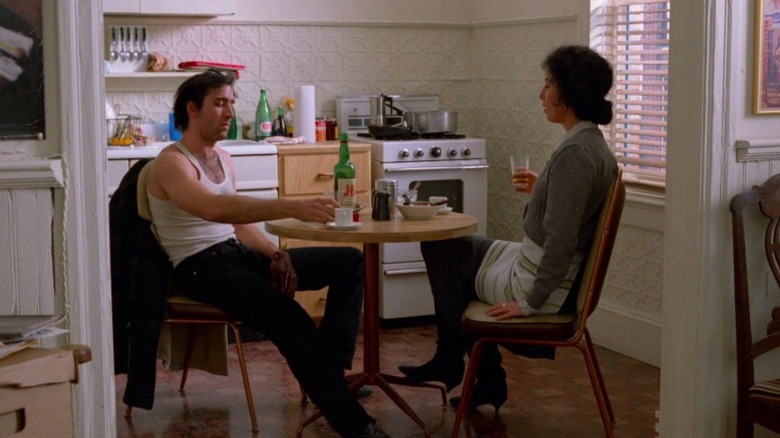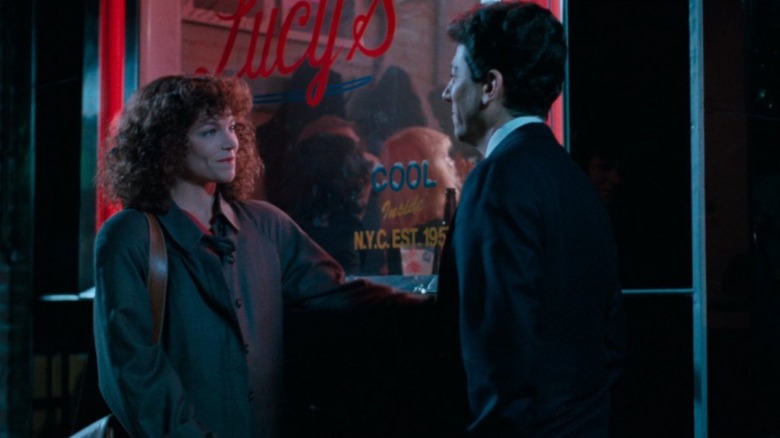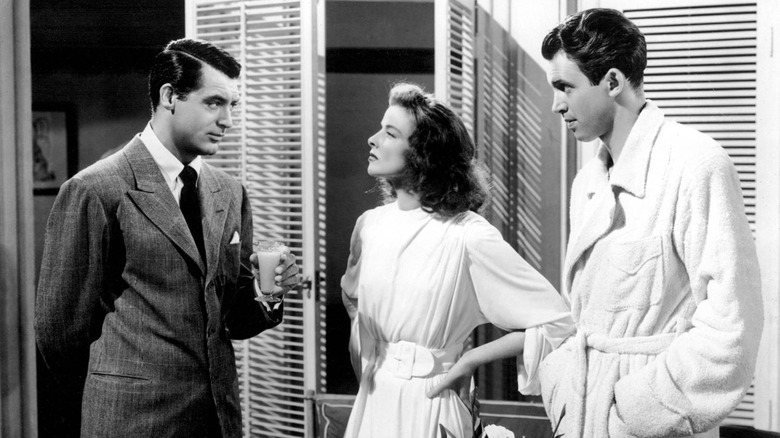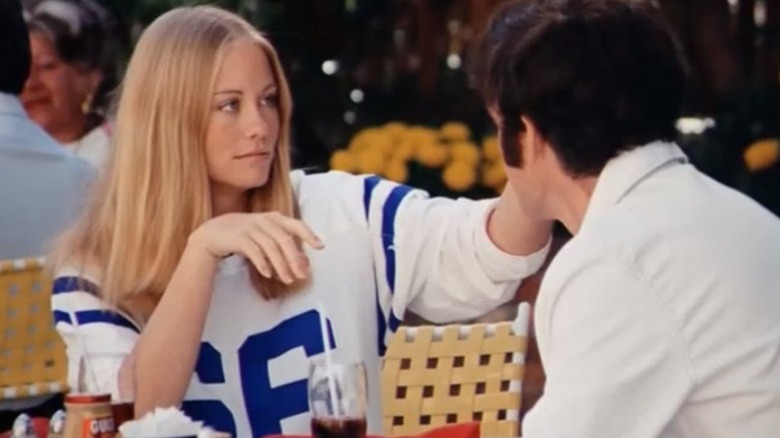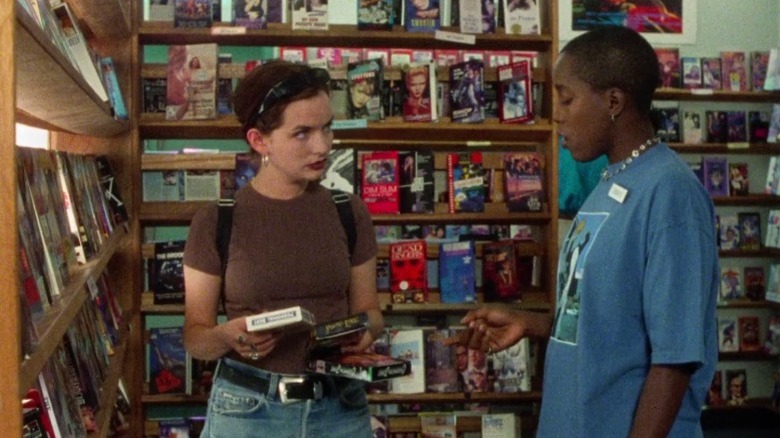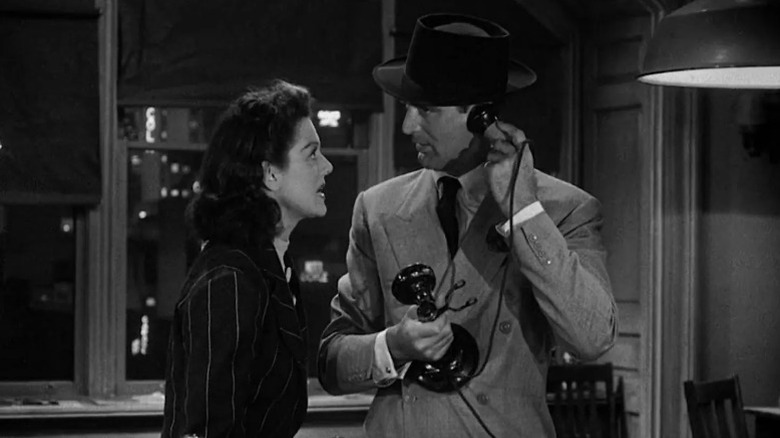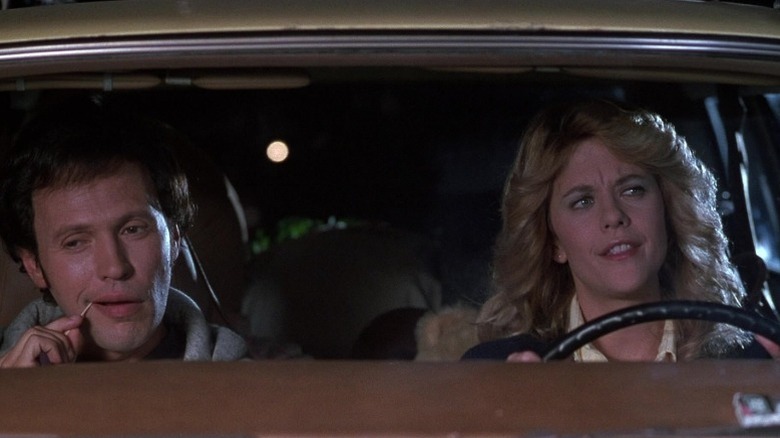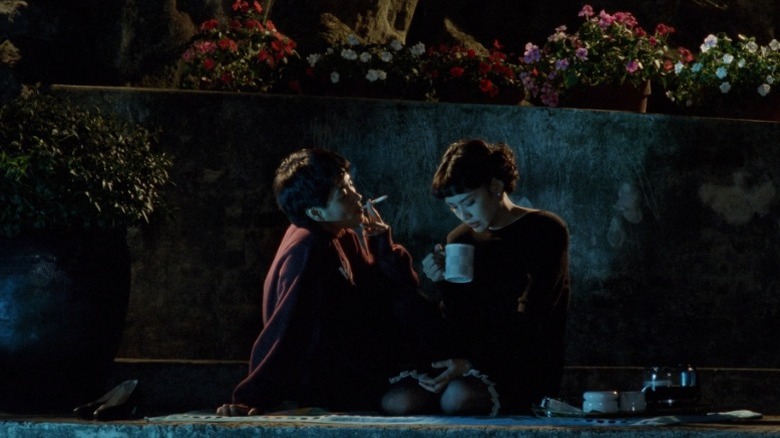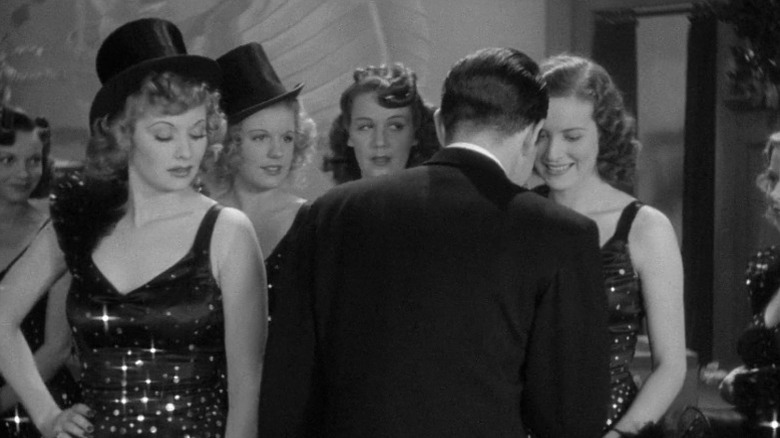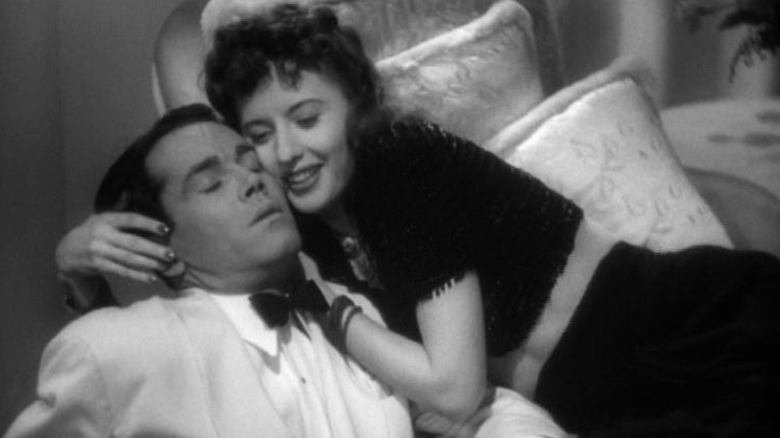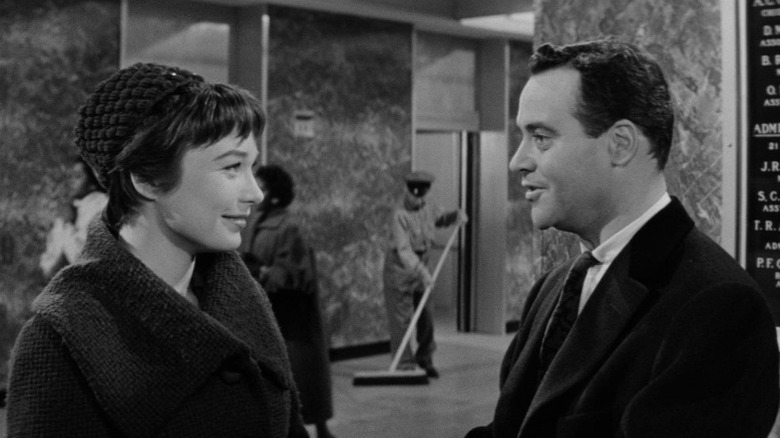15 Best Romantic Comedies Of All Time, Ranked
There's nothing better than a good romcom. It's a genre that took root pretty much as soon as movies could talk, and, for all its accused repetitiveness, has been going strong ever since, always finding fresh new ways to assert its worth.
In the past century of film history, we've seen great romantic comedies ranging from the sweet to the wild to the darkly hilarious to the slyly subversive; the only thing that hasn't changed is the enduring appeal of watching charismatic stars flirt, trade barbs, field misunderstandings, and ultimately fall — or not — into each other's arms.
To create this ranking of the best romantic comedies ever, we've looked over the genre's entire chronology, and carefully plucked classics from all eras. Every single one of these films is essential viewing, to be clear; there's no going wrong here if you're looking for recs.
15. Design for Living
Adapted from the eponymous 1932 play by Noël Coward, 1933's "Design for Living" is perhaps the single greatest example of what a wellspring of creativity pre-Hays Code American cinema could be. Directed by the great Ernst Lubitsch, who never made a bad movie, it tackles subject matter that Hollywood would take decades to even think about broaching again, and does it with effortless pep and boundless enthusiasm. To be more specific: It's a romcom about a throuple, and, in the 90-plus intervening years, we have yet to see a better one.
Miriam Hopkins plays Gilda Farrell, a commercial artist who meets two fellow Americans on a train to Paris: Playwright Tom Chambers (Fredric March) and painter George Curtis (Gary Cooper). They both fall in love with Gilda, but she can't choose between them, so they try out a platonic three-way living arrangement — which naturally doesn't go quite as planned. Smart, delightful, and armed with one of Ben Hecht's sharpest scripts, "Design for Living" also has the distinction of being a lot more advanced and open-minded in its understanding of love and companionship than most contemporary films.
14. You've Got Mail
If contemporary times pose a challenge to the romcom format, in that the process of falling in love now involves virtual waltzes of texting and social media interaction with limited cinematic potential, Nora Ephron's "You've Got Mail" captures the exact moment of that logistic shift, in a way that renders it as "dated" in the most fun way possible.
The plot, liberally adapted from Ernst Lubitsch's "The Shop Around the Corner" by the director herself along with her sister Delia Ephron, follows Kathleen Kelly (Meg Ryan), a small bookshop owner whose independent business is threatened by bookstore chain mogul Joe Fox (Tom Hanks). Unbeknownst to both Kathleen and Joe, they begin to fall in love via email after meeting in an online chatroom.
It's a quintessentially 1998 setup, the inherent thorniness of which only emphasizes Ephron's brilliance in navigating the potential pitfalls of the central romance. Somehow, she turns that uneasy dynamic into one of cinema history's most potent encapsulations of the enduring appeal of mainstream romcoms — with each glance, each gesture, each movement in the needle of intimacy making for its own heartrending fireworks show.
13. Monsoon Wedding
There have been many "mosaic romcoms" in movie history — i.e., ones that look at the trials and tribulations of various pairs in different stages of romantic progression, instead of focusing on just one couple — but few have been as attuned to that format's lush, convivial, celebratory potential as Mira Nair's "Monsoon Wedding."
Following various stories revolving around the preparations for the expensive arranged wedding between Aditi Verma (Vasundhara Das) and U.S.-based newcomer Hemant Rai (Parvin Dabas) in Delhi, India, Nair's Golden Lion-winning 2001 film deals with love in all its toughness and complexity, often veering closer to straight drama than most romantic comedies. Yet the seriousness and depth of Sabrina Dhawan's script never detract from how deeply pleasurable and enchanting "Monsoon Wedding" is.
Nair's camera is charged with curiosity and motivation as she explores every corner of the Verma household, nimbly documenting the myriad joys and conflicts spurred by the gathering of family members from all around the world. Meanwhile, the anchoring story of Aditi and Hemant themselves is carried off with unimpeachable intelligence, candor, and sensitivity. It's romcom perfection exponentially multiplied.
12. The Big Sick
Romantic comedies from the 2010s onward have consistently endeavored to find new spins on the genre's standard format, ranging from the modestly eccentric to the fully subversive. And, from a pure structural standpoint, few gambits have been as bold — or as successful — as that of "The Big Sick," hailed in 2017 as the most unique romantic comedy in years.
Written by Emily V. Gordon and star Kumail Nanjiani as a largely autobiographical piece, "The Big Sick" follows struggling comedian Kumail (Nanjiani) and graduate student Emily (Zoe Kazan) as they meet, fall in love, run into trouble, and break up — but that's only the first 30 minutes. One day, Emily is admitted to a hospital with unknown health problems, and Kumail is the only person available to sign off on an emergency-induced coma.
Thus begins an awkward odyssey in which Kumail remains in the orbit of Emily and her concerned parents (Holly Hunter and Ray Romano), who have flown in from North Carolina while navigating arranged marriage pressures from his own parents (Zenobia Shroff and Anupam Kher). It's all raw, messy, authentic, improbably hilarious, and deeply human, with the benefit of a fact-based, hard-earned happy ending.
11. Moonstruck
Although it's not infrequent for movies to win Academy Awards in multiple acting categories — there have, in fact, been 41 such cases in the Oscars' almost 100-year history — the vast majority of those double-dippers have been showy, shouty, tragic prestige dramas. It takes a special movie to draw that kind of attention as a light classic-style romcom, and special is just what Norman Jewison's "Moonstruck" is. Indeed, the fact that "Moonstruck" managed to snag Oscar wins in 1988 not just for Cher as hot-tempered New Yorker widow Loretta Castorini, but also for Olympia Dukakis as her melancholy mother Rose and for John Patrick Shanley's screenplay, speaks pretty aptly to the film's transcendent power.
"Moonstruck" lays out one of the clearest cases ever for the romantic comedy as an inherently humanist proposition — a popular genre where every character matters, where multiplex-sized engagement is drawn not from battles, scares, or pyrotechnic displays but from people and their passions. And the brittle, hilarious courtship that unfolds between Loretta and her gruff brother-in-law Ronny Cammareri (Nicolas Cage, for whom there is a downside to the film's popularity) is up there with the most swoon-worthy movie romances of all time.
10. Crossing Delancey
American filmmaker Joan Micklin Silver was a New Hollywood luminary whose work took decades to get the recognition it deserved — perhaps because her films were too personal, too uncompromising, too gleefully idiosyncratic to negotiate with '70s and '80s mainstream tastes, or perhaps just because she was a female auteur at a time when female auteurs weren't taken seriously. Whatever the case, her filmography is a treasure trove of hidden gems, as exemplified by 1988's "Crossing Delancey," rarely cited yet self-evidently belonging among the best romcoms of all time.
The film, adapted by Susan Sandler from her own play, follows Isabelle Grossman (Amy Irving), a lonely New York City bookstore owner who has all but given up on love. One day, however, Isabelle finds herself given two possible paths to romantic fulfillment in the form of married author Anton Maes (Jeroen Krabbé), whom she met at work, and mild-mannered pickle salesman Sam Posner (Peter Riegert), to whom she was begrudgingly introduced by a matchmaker hired by her bubbe (Reizl Bozyk). As Isabelle ponders her heart's wants, Silver paints a sumptuous, deeply specific portrait of time and place, crafting a masterwork as proudly Jewish as it is irresistibly universal.
9. The Philadelphia Story
While extramarital affairs were obviously commonplace in real life in the '30s and '40s, their depiction on screen was severely limited by the Hays Code — which led Hollywood filmmakers to fashion the "comedy of remarriage," a hugely popular subgenre about couples divorcing and embarking on various dalliances before finding their way back to each other. And the most iconic comedy of remarriage was George Cukor's "The Philadelphia Story."
The rare movie with a perfect Rotten Tomatoes score, this 1940 film finds its central trio of Katharine Hepburn, Cary Grant, and Jimmy Stewart all in their prime — which would, on its own, be more than reason enough for a watch. But, in addition to naturally featuring stellar acting, "The Philadelphia Story" also epitomizes the sprightly wit, sturdy construction, relentless dynamism, and enthralling tension that were the mark of the best Classic Hollywood crowd-pleasers. By the end of the story of socialite Tracy Lord (Hepburn) and the havoc wreaked in her marriage plans by her ex-husband C.K. Dexter Haven (Grant) and tabloid journalist Mike Connor (Stewart), it's impossible not to find yourself grinning from ear to ear.
8. The Heartbreak Kid
You've seen sharp, dark, biting, and even cynical romantic comedies, but there's a good chance you haven't seen anything quite like 1972's "The Heartbreak Kid" — not least because its few home media releases have since gone out of print. Arguably the finest directorial effort from the ever-brilliant Elaine May, "The Heartbreak Kid" is a tough lesson in love that doesn't pull its punches — a film so scorchingly hilarious that it's almost easy to miss its poignancy and wisdom.
The script by Neil Simon concerns Lenny Cantrow (Charles Grodin), a shallow New York sporting goods salesman who impulsively marries his abstaining girlfriend Lila (Jeannie Berlin) so that they can have sex; while on honeymoon in Miami, Lenny realizes that he can't stand Lila, and finds himself drawn to vacationing WASP college student Kelly Corcoran (Cybill Shepherd). A farce of epic proportions ensues, which May shoots with her trademark cleverness and comic precision — but underneath it all is a subversive love story for the ages, containing a fearless indictment of male entitlement that remains startling to behold even five decades latter.
7. The Watermelon Woman
Generally cited as the first feature film on record to hail from an openly lesbian Black director, 1996's "The Watermelon Woman" is a film of such dizzying intelligence and unflagging epistemological rigor that it would probably merit mention as a classic even if it weren't also an immensely fun watch — which it very much is. Writer, director, and star Cheryl Dunye plays Cheryl, a Philadelphia video store worker who begins to make a documentary on the life of an elusive Black actress from Old Hollywood who was only ever credited as "the Watermelon Woman."
Dunye uses that setup to create a bracing, passionate, and hilarious treatise on the exclusionary nature of artistic canons and official histories, all refracted through her own enthusiastic cinephilia. And, to make her own contribution to the transformation of those canons, she also weaved together arguably the finest queer romantic comedy of all time, locating enough verve, sensuality, and complexity in Cheryl's budding romance with Diana (Guinevere Turner) to fill you with indignation at the fact that video store shelves were so bereft of lesbian romcoms for so long.
6. His Girl Friday
Howard Hawks was a master of the balletic high-wire plate-spinning act that has since become known as the "screwball comedy" — that delectable style of Old Hollywood film in which gendered romantic tensions are blown up to farcical proportions, and every witty rejoinder adds another layer to a step pyramid of euphoric chaos. Even within his own rarefied metric, though, what Hawks accomplished in 1940's "His Girl Friday" was a stunning feat by technical standards alone — never mind all the other standards.
Simply put, "His Girl Friday," in which Cary Grant and Rosalind Russell play a newspaper editor and a reporter who get together after their divorce to cover one last scoop, is the most breathlessly entertaining screwball comedy of all time. The whole movie is essentially a nonstop sequence of perfect gags and one-liners and verbal ping-pong matches, all braided together with a journalistic procedural story that gets to be hilarious in its sheer delirious intensity. And, of course, Russell and Grant's chemistry is just off the charts, constantly radiating the harmonious melody of fated lovers even when they're just bickering over what to include in the lede.
5. When Harry Met Sally...
The snappy talk, the local color, the mélange of weary realism and intense yearning, the grown-up sense of wistfulness and urgency, the blazing onscreen chemistry, the trenchant observational humor — every key aspect of the contemporary romcom is refined to perfection in "When Harry Met Sally..." It's the ur-text of all films made in the genre from the '90s onward, containing the platonic versions of nearly every trope you can name.
The best work from both Rob Reiner as director and Nora Ephron as screenwriter, the 1989 film tells the story of University of Chicago colleagues Harry Burns (Billy Crystal) and Sally Albright (Meg Ryan), who strike an intimate friendship over the course of several years, yet opt to actively avoid any sexual or romantic entanglement — until, of course, they don't. It's one of the most believable, lived-in, and profound relationships the genre has ever given us, and that only makes the catharsis of its eventual acceleration into romantic bliss all the sweeter and more meaningful. Lots of romcoms get the rom-com template right; "When Harry Met Sally..." is among the few to get love right, full stop.
4. A Confucian Confusion
Taiwanese master Edward Yang became known in the West for his sprawling and ultra-lengthy epic dramas about grief, alienation, and regret — most notably 2000's "Yi Yi" and 1991's "A Brighter Summer Day." But, in 1994, Yang showed that his generational mastery of blocking, storytelling, and visual poetry extended beyond the realm of the tragic. In "A Confucian Confusion," he made an effervescent cosmopolitan romcom that distilled the changing tides of Taipei life into just three days of romantic misadventure.
Like many of Yang's films, "A Confucian Confusion" is generous in scope, following multiple characters whose lives brush up against each other in increasingly surprising, hilarious, and complicated ways — with the crux being the tense interplay between romantic and professional ambition, as manifested through the ins and outs of an entertainment production company. Every story and every character is mesmerizing on their own; together, they make up a gorgeous, bittersweet paean to love's way of breaking through modern anxiety.
3. Dance, Girl, Dance
The only problem with "Dance, Girl, Dance" is that, after watching it, you'll have a much harder time forgiving the dated aspects of other Golden Age Hollywood flicks. Shockingly modern and forward-thinking even by today's standards, the 1940 movie is both the magnum opus of filmmaking pioneer Dorothy Arzner and the double-star-is-born moment of none other than Maureen O'Hara and Lucille Ball.
O'Hara and Ball play Judy O'Brien and Bubbles, two Ohio chorus dancers whose careers veer in vastly different directions and then meet again in a New York City burlesque club, igniting professional and romantic rivalry as they battle for the affections of wealthy bachelor Jimmy Harris (Louis Hayward). If that pitch hints at the sort of catty infantilization that most male directors of the time emphasized in these stories, Arzner takes the movie in the diametrically opposite direction. Without skimping on zaniness, energy, and fun, she locates a genuinely searing story of complex female friendship, ambition, identity, and self-affirmation amid the bustle and hustle, and draws enough range from Ball and O'Hara to prove that their respective comedic and dramatic careers could just as well have been switched. Few '40s movies reach such titanic heights.
2. The Lady Eve
On its face, 1941's "The Lady Eve" is hard to describe as anything other than a cackling romantic farce: Con artist Jean Harrington (Barbara Stanwyck) sets her sights on fleecing naive heir Charles Pike (Henry Fonda); in the process of wooing him, she accidentally falls in love as well; he finds her out and dumps her; to win him back, she assumes the persona of posh British tourist Lady Eve Sidwich and shamelessly swaggers back into his life. On some level, the whole movie is making a joke of the very idea of romance, flighty and delusional and deception-based that it is.
But even so, "The Lady Eve" succeeds in mustering investment in its kooky romance by the power of movie magic — in this case, manifested through the ethereal performances of Stanwyck and Fonda. They make you believe in a love propped up by little more than the mutual gravitational pull of their outsized presences, Stanwyck practically demanding fascination with her every smirk and movement, and Fonda servicing her at each turn with doe-eyed, heart-melting charm. And it doesn't hurt, of course, that, thanks to the virtuosity of writer-director Preston Sturges, "The Lady Eve" is also one of the absolute funniest movies of all time.
1. The Apartment
1960's "The Apartment" is a towering monument at the center of romcom history, linking together its ritzy past and soulful present, while also sporting such ecstatic audiovisual perfection as to inevitably inform whatever its future may be. Its plot alone is a thing of beauty, engineering-wise: Lonely insurance worker C.C. "Bud" Baxter (Jack Lemmon, the only actor who could make this movie work) allows higher-ups to use his apartment for extramarital trysts in exchange for career favor; one day, he falls in love with elevator operator Fran Kubelik (Shirley MacLaine), the very woman in whose company slimy personnel director Jeff Sheldrake (Fred MacMurray) is currently frequenting Bud's flat.
What Billy Wilder and co-writer I. A. L. Diamond spin from that sleek dramaturgical mechanism is perfection on all fronts — a great game of uneasy comic flirtation, nestled in a great tale of two lonely souls yearning for connection, wrapped in a great exposé of capitalist inhumanity, all within an open-hearted plea for the universal value of love and solidarity. It's Wilder's most thoroughly Wilderian effort — in other words, one of the greatest movies ever.
